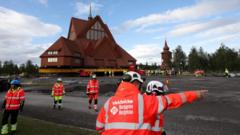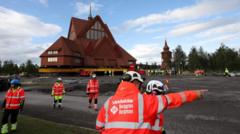Kasem Abu al-Hija's painful loss in a missile strike has unearthed deep divisions in Israeli society, notably in how Arab communities perceive safety and acceptance within Israel. The lack of shelters and ongoing discrimination against Arab citizens exacerbates tensions, as grief intertwines with a call for political accountability.
Grief and Anger Unite Tamra Community Following Tragic Missile Strike

Grief and Anger Unite Tamra Community Following Tragic Missile Strike
A father's anguish over the loss of his family in an Iranian missile attack highlights disparities facing Israel's Arab communities.
In the aftermath of a devastating Iranian missile strike in Tamra, an Arab-majority town in northern Israel, the tragic loss of four family members has brought to light the systemic inequalities faced by Arab citizens in the nation. Kasem Abu al-Hija, 67, mourns the deaths of his daughter Manar Khatib, two granddaughters Shada, 20, and Hala, 13, and their aunt Manal Khatib, 41, who were killed as the missile hit their home. With little warning, the attack resulted in chaos, with rescuers sifting through debris to find the victims.
As the community grieves, tensions intensify with a viral video depicting Israelis singing an anti-Arab chant that taunted the devastation inflicted upon Abu al-Hija's family. Although President Isaac Herzog condemned the video as "appalling," the incident echoes wider societal fractures. Residents of Tamra have long pointed out the glaring absence of public bomb shelters, a stark contrast to the approximately 126 found in the neighboring Jewish-majority town of Karmiel.
This discrepancy is not just geographical but systemic. According to a report by Israel’s State Comptroller, nearly half of Arab communities lack adequate shelter. Disparities in funding and planning have led to many homes being constructed without reinforced safe rooms, leaving families exposed to threats.
Experts note that state support for Arab municipalities has come up short, particularly in emergency preparedness measures. Approximately 40% of residences in Tamra are equipped with safe rooms, compelling many residents to seek refuge at neighbors' homes during attacks, often resulting in chaos amid rapid warning sirens.
The continued struggles extend beyond the immediate impacts of violence. In recent surveys, 67.9% of Arab Israelis opposed the military actions against Iran, while a significant portion expressed feelings of fear and despair. Activists assert that the discrimination felt by Arab society reaches into education and employment, along with a heightened sense of neglect.
Despite government initiatives aimed at closing these gaps, funding reductions under the current right-wing coalition hinder progress, compounding existing grievances. Social equity efforts have stalled, leading to frustration among Arab citizens who feel increasingly sidelined as conflict intensifies.
As Tamra faces its grief, voices within the community plead for a cessation of violence, emphasizing the shared humanity that transcends ethnic divides. Kasem poignantly encapsulated the community's sentiment: "The bombs do not choose between Arabs or Jews. We must end this war. We must end it now."
Together, amid loss and anger, residents join in vigil, reflecting on not just the lives lost but the urgent need for dialogue and reconciliation in a time of crisis.






















